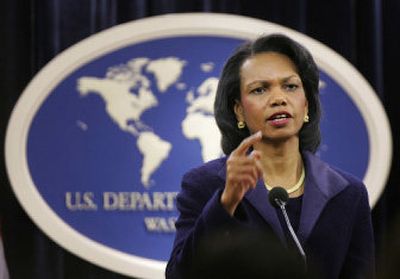N. Korea deal is déjÀ vu

WASHINGTON – The tentative international nuclear agreement with North Korea marks a fundamental shift in direction for the Bush administration, which for years had sternly demanded that Pyongyang abandon its nuclear program before receiving any rewards.
In his first term, President Bush rejected Clinton administration attempts to win North Korean cooperation with aid and declared that only after “complete, verified, irreversible dismantlement” of its nuclear program could the autocratic regime receive U.S. help.
But as the White House held fast to its hard-line approach, Kim Jong Il’s rickety government built an estimated eight to 10 bombs, experimented with missile launches, conducted a nuclear test and seemed poised to continue the buildup with impunity.
The agreement reached Tuesday would bring Pyongyang back to the bargaining table, with pledges to freeze its primary nuclear reactor and to discuss dismantling its entire nuclear infrastructure. It was hailed by Secretary of State Condoleezza Rice as a “breakthrough.”
But the deal also gives the impoverished regime an immediate 50,000 tons of energy assistance and other aid upfront and commits the United States to the kind of direct talks with the North Koreans that the White House had long ruled out.
The deal provoked outrage from conservative allies of the administration who said it flatly contradicted Bush’s previous policy. At the same time, some former Clinton administration officials termed it a step in the right direction but questioned why it took Bush so long.
Many observers acknowledged that the White House had few choices.
“They recognized that they had to adopt a practical approach,” said Gary Samore, a National Security Council official during the Clinton administration who is at the Council on Foreign Relations. “They had to do something to stabilize the situation, or they would face a full-blown crisis on the Korean peninsula.”
The pending accord reached Tuesday is only a first step toward a negotiated end to North Korea’s nuclear program, U.S. officials acknowledged. It calls for the regime to shut down and seal its primary nuclear facilities, at Yongbyon, and to allow the return of U.N. nuclear inspectors to verify the process. Then the North Koreans will begin a complex series of talks with the United States, South Korea, Japan, China and Russia.
If North Korea discloses all its nuclear programs, and disables all facilities, it would be entitled to additional aid including 950,000 tons of heavy fuel oil. The process also promises North Korea a chance to reach two other goals: normalized relations with the United States and removal from the U.S. list of government sponsors of terrorism.
Yet, U.S. officials acknowledge that there are numerous issues that could derail a process that has faltered again and again since 1993. “This is the first quarter, not the fourth,” Rice cautioned.
Some critics of the administration were quick to charge that the deal had gotten the White House back to where it was at the beginning of Bush’s first term.
“This deal takes us back to the future,” said Sen. Joseph R. Biden Jr., D-Del., chairman of the Senate Foreign Relations Committee. “The good news is that it freezes in place North Korea’s nuclear program. The bad news is that North Korea’s program is much more dangerous to us now than it was in 2002, when President Bush rejected virtually the same deal he is now embracing.”
From a conservative perspective, Bruce Klingner of Heritage Foundation said the deal “sends a dangerously accommodating signal not only to North Korea but also to Iran and any other aspiring nuclear-weapons state.”
Rice, defending the deal, said the United States was entering the talks in a much better position than it had during the days of the so-called “Agreed Framework” negotiations initiated in 1994 by the Clinton administration. Bush abandoned those talks in November 2002, amid signs that Pyongyang was carrying on a secret uranium-based bomb program.
Rice said the difference now is that the United States has greater leverage over North Korea because of the influence of the four other countries coming to the negotiating table. China, the North’s primary energy source and chief trading partner, has brought pressure on Pyongyang since its nuclear test in October, U.S. officials said.
Rice also asserted that the upfront aid Pyongyang would receive for coming back to the table was “modest” – only a fraction of the 2 million tons of heavy fuel oil it was demanding.